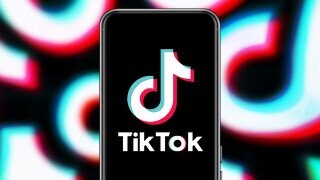Black TikTok Creators Are Striking Over Appropriation of Their Content: 'Give Credit Where It's Due'

Bad news for older millennials who planned on learning a TikTok dance to Megan Thee Stallion's “Thot Shit” in a desperate attempt to cling to the remaining shreds of their youth despite the slow, terrifying passage of time bringing them closer and closer to to the big 4-0: Unlike every other Megan Thee Stallion song that has graced our ears over the past several years, there will be no official dance to her latest single, the deliberate product of Black creators on the app striking over the appropriation of their content.
It all started last Friday when TikTok creator Erick Louis took to the app and his platform of more than 212,000 followers to share a video featuring the popular new track. "MADE A DANCE TO THIS SONG," reads the text sitting atop his video, “Thot Shit” playing in the background as he bounces as if preparing to perform the dance of the decade. Yet right as it seems Louis is about to bust a move, he stops, raising two middle fingers instead. “SIKE. THIS APP WOULD BE NOTHING WITHOUT PEOPLE,” reads the on-screen text.
@theericklouis
Shortly after hitting the internet, the video not only went viral, garnering more than 430,000 views in a week since its posting, but also launched a movement among Black creators – a widespread strike demanding the credit they deserve in bringing life to some of the app's most popular trends.
Don't Miss
"On the app specifically, for Black creators, it is very hard even being given the space to speak on whatever we think," 21-year-old Louis told NBC News of the movement. "It's crazy that we have to do this on a kids' app."
He later emphasized this sentiment, comparing the TikTok movement to other types of protests while speaking to the New York Times. “Black people carry the app,” Louis explained. “Similar to the ways off the app Black folks have always had to galvanize and riot and protest to get their voices heard, that same dynamic is displayed on TikTok,” he said. “We’re being forced to collectively protest.”
However Louis is far from alone in his dedication to the movement – over the past week, several other Black creators have jumped on board with the protest, using their platforms to speak out about the strike and how the trend of Black creators being snubbed for their work is indicative of systemic racism.
"Black TikTokers refusal to have their work and culture appropriated taps into a larger history of white capitalists profiting off of the unpaid labor of Black Americans," explained creator defineandempower.co in a video series breaking down the strike.
@defineandempower.co
TikTok, too, has also seemingly expressed their support, issuing a statement to the New York Times on the matter. “We care deeply about the experience of Black creators on our platform and we continue to work every day to create a supportive environment for our community while also instilling a culture where honoring and crediting creators for their creative contributions is the norm," it said.
The move also comes a few months after late-night host and allegedly notorious douchecanoe, Jimmy Fallon, invited social media star Addison Rae to perform several popular TikTok dances on The Tonight Show, snubbing the Black creators who actually created some of the featured routines. Although as a result of this backlash, Fallon invited several of these choreographers onto his show to discuss their contributions, the situation indicates a larger trend of white creators finding fame, popularity, and even sometimes business opportunities by profiting from the uncredited work of Black creators.
“I think they were all credited in the original YouTube posting, but it’s kind of hard to credit during the show,” Rae explained. “But they all know that I love them so much and, I mean, I support all of them so much. And hopefully one day we can all meet up and dance together.”
Rae isn't a lone example of this disturbing phenomenon – In early 2020, Zoomer superstar Charli D'Amelio found herself in the hot seat after popularizing the dance to “Renegade,” without crediting the choreographer behind the viral trend, Jalaiah Harmon, who was just 14-years-old at the time, the Washington Post noted. Although Harmon ultimately ended up getting recognition for her work, it was a long, tough journey. "I was happy when I saw my dance all over," Harmon said of her dance's popularity. "But I wanted credit for it."
Yet as Louis noted, the point of the strike isn't to forbid non-Black people from partaking in popular TikTok trends launched by Black creators, it's about requesting fair credit for their contributions.
"We're not saying not to use our content," Louis explained. "We're saying give credit where it's due." So what exactly does properly crediting Black creators look like? When speaking with NBC News, Louis cited the viral popularity of a dance created by TikTok user @LayzChipz to the song "Twerkulator." When other popular creators shared her video, they credited her for the choreography, leading to her ultimately meeting with and collaborating with the song's artist and building a large platform on the app.
"She made that little dance on TikTok, not knowing where it would end up, and now she's at almost 600,000 followers and the City Girls know her and it's all because people credited her and people fought to have her credited," he explained.
@layzchipz
So folks, next time you hop on a TikTok trend, make sure to credit the artist whose work you're using. It's not that hard and can make all the difference.
For more internet nonsense, follow Carly on Instagram @HuntressThompson_ on TikTok as @HuntressThompson_, and on Twitter @TennesAnyone.